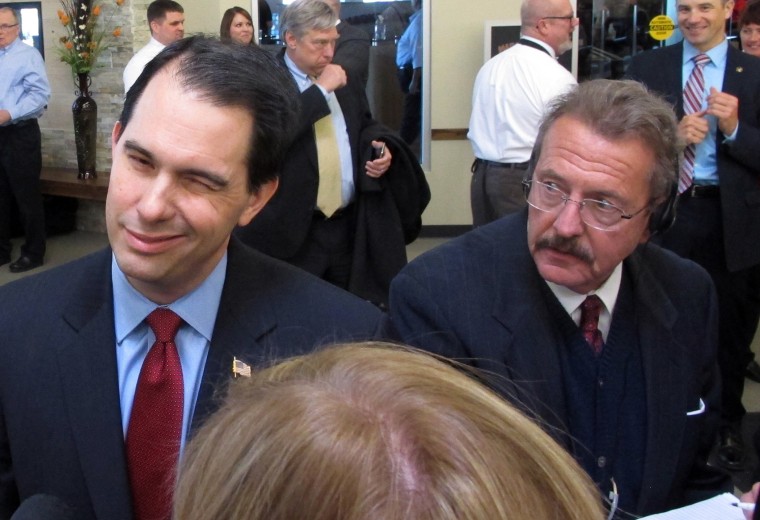This federal district
court ruling hasn't received too much attention over the last 24 hours, which is a shame because its scope is pretty significant.
A federal judge Tuesday blocked enforcement of a Wisconsin election law that's at the center of an investigation into Gov. Scott Walker's 2012 recall campaign and more than two dozen conservative groups. U.S. District Judge Rudolph Randa granted the request to block the law from the Milwaukee-based group Citizens for Responsible Government Advocates while the conservative group's underlying lawsuit challenging its constitutionality goes forward.
Let's back up for a minute, because there's an important context to all of this.
As regular readers
may recall, Wisconsin election laws prohibit officials from coordinating campaign activities with outside political groups. Gov. Scott Walker (R) and his team have been accused of breaking these laws by directly overseeing how outside groups -- including some allegedly non-partisan non-profits -- spent their campaign resources during the governor's recall campaign.
When Judge Randa, a Republican appointee
active in far-right judicial/political circles, first heard the case involving Walker, he ruled in the governor's favor -- not because Walker was innocent, but because the judge believed the law against coordination is effectively impossible to break. For Randa, the law was intended to prevent bribery and explicit corruption, which means so long as politicians are coordinating with groups that agree with them, anything goes.
As
Alec MacGillis explained in June, "This is a striking claim, reminiscent of the Supreme Court's recent rulings against limits on campaign contributions -- that limits can only be justified as bars against explicit attempts to bribe politicians to change their stances on issues."
Under Randa's reasoning, it doesn't matter if allegedly non-partisan non-profit groups exert influence over an election, so long as the groups don't exert influence over an elected official.
The consequences of such thinking have the potential to be quite broad.
My colleague Nazanin Rafsanjani flagged
this report from the
Milwaukee Journal Sentinel, which did a nice job highlighting the implications.
The ruling -- coming three weeks before the Nov. 4 election -- effectively allows candidates to work closely with the groups as long as the groups don't explicitly tell people how to vote. The groups would still be permitted to run sharply worded ads that praise or denigrate those on the ballot.
In other words, Walker, who's facing a very tough challenge from Mary Burke, not only benefits from the voting restrictions he imposed on Wisconsin, he can now largely ignore state laws prohibiting coordination between his campaign and outside groups.
How did Randa respond to the legal arguments presented by the other side? It's
a funny story, actually.
Randa issued his latest order even though those who are being sued didn't have an attorney until Monday. Because the lawyer was only recently hired, he has not submitted a brief to the judge explaining his clients' views on campaign finance laws or why they believe they are valid. [...] Republican Attorney General J.B. Van Hollen refused to represent them because he does not agree with their views of campaign finance laws. That left it to Walker's office to appoint attorneys for them. Walker's chief counsel, Brian Hagedorn, asked Randa for more time while he tracked down attorneys. On Monday, he hired attorney Daniel Kelly, who on Tuesday also asked for more time, writing he hadn't yet talked to all his clients and believed "the state will be prejudiced in its ability to address the motion for preliminary injunction if it must file a memorandum before October 20." Soon after Kelly asked for more time, Randa issued his order limiting how the campaign finance law can be applied.
